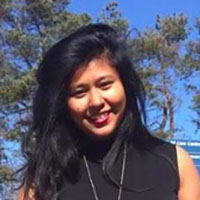
Fateha Hossain
Major: International Development Studies
Minors: Food Studies and History
What factors contributed to you choosing your program(s)?
When applying to UTSC, I entered into the International Development Studies (IDS) Co-op program, but by the end of my second year, I decided to complete a major in International Development Studies, and two minors in History and Food Studies. The IDS Co-op program provides an amazing opportunity for students to apply their knowledge in the field during their co-op placement. However, in my second year, I worked on a research project called Scarborough A Little Taste (SALT), which is an online website that highlights prominent cuisines in Scarborough, and through taking food studies courses at UTSC, my research interests grew into understanding the intersection between local development and the role that food played in addressing those issues. As such, I found that the combination of studies that I am currently pursuing allows me to cultivate my research interests, craft a set of useful skills, and provide a more robust foundation to understand the world around me.
Can you describe your program(s)? What is it actually like?
I would say that my programs complement each other quite nicely, so when trying to understand certain concepts or write essays about particular subjects, I find the things I learn in my other courses help to enhance my learning. Like many other humanities or social sciences programs, there is a lot of writing, but the help that I’ve received in trying to make sense of what I’m trying to research or understand is useful and appreciated. I find that my History minor teaches me the importance of analyzing things with a historical perspective, and is my opportunity to explore courses outside of my core research interests. Another aspect that I truly enjoy is the opportunity to engage fellow students in discussions about topics that I learned in other courses in order to understand their perspectives. The connections I am able to develop with friends and professors make what I’m learning more enjoyable and accessible, and partaking in various research work-study projects also helps to enhance my learning.
What tips/advice can you provide to students just starting or considering this program(s)?
- Try to attend some of the events being organized by the department(s) and its student associations/clubs.
- Get to know your professors and teaching assistants, and maintain that relationship, even after you’re finished the course.
- Ask about research or work opportunities from professors and teaching assistants, or look on CLN (cln.utoronto.ca) to see if there are any postings that relate to your program/research interests, and then apply for them!
What will you do with your degree after graduation?
To be quite honest, I don't have anything planned very specifically, but some of the directions I'd like to pursue are in food policy, further research, and community development. I believe that by taking the opportunities that are presented to me that I feel passionate about; I will be able to remain flexible and open in my endeavours.
What has your academic journey during your time been like as you progress toward graduation?
In first year, I took on a full course load along with a work study position and another part time job, and because of certain family situations going on at home, my struggles had more to do with my emotional well-being. Though my grades were not as satisfactory as I would have hoped, making that adjustment from high school to university encompassed more than just being a good student. It showed me the importance of prioritizing my well-being, general time management skills, and that ultimately, grades do not determine my self-worth. In second year, I incorporated more history and food studies courses into my studies such as HISB14 - Edible History: History of Global Foodways and WSTC24 - Gender in the Kitchen, which I found helped me to navigate my research interests. However, because of a very intensive workload, in the second semester of my second year, I took a part time course load which I found to be much more helpful. Taking that slight break helped me to refocus and reflect, and again, prioritize my well-being. Now having completed the first semester of my third year with a full course load, I took a research and writing course called Critical Writing and Research for Historians (HISB03) that helped to identify areas of strength and improvement in my research skill set. The course called the International Development of Food (IDSC14) also helped to bridge International Development Studies and Food Studies by illuminating the connections, issues, and theorists whose work ties those two fields together. Looking forward, I hope to continue practicing emotional resilience and developing my time-management and other skills, while finishing my studies.